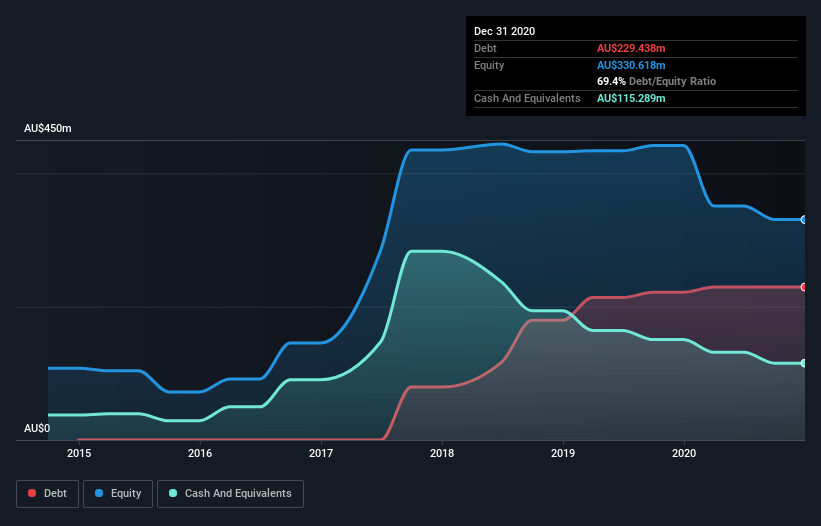Some say volatility, rather than debt, is the best way to think about risk as an investor, but Warren Buffett famously said that 'Volatility is far from synonymous with risk.' When we think about how risky a company is, we always like to look at its use of debt, since debt overload can lead to ruin. We can see that Cooper Energy Limited (ASX:COE) does use debt in its business. But should shareholders be worried about its use of debt?
Why Does Debt Bring Risk?
Generally speaking, debt only becomes a real problem when a company can't easily pay it off, either by raising capital or with its own cash flow. Part and parcel of capitalism is the process of 'creative destruction' where failed businesses are mercilessly liquidated by their bankers. While that is not too common, we often do see indebted companies permanently diluting shareholders because lenders force them to raise capital at a distressed price. Of course, the upside of debt is that it often represents cheap capital, especially when it replaces dilution in a company with the ability to reinvest at high rates of return. When we examine debt levels, we first consider both cash and debt levels, together.
See our latest analysis for Cooper Energy
How Much Debt Does Cooper Energy Carry?
As you can see below, Cooper Energy had AU$229.4m of debt, at December 2020, which is about the same as the year before. You can click the chart for greater detail. On the flip side, it has AU$115.3m in cash leading to net debt of about AU$114.1m.

A Look At Cooper Energy's Liabilities
We can see from the most recent balance sheet that Cooper Energy had liabilities of AU$119.2m falling due within a year, and liabilities of AU$564.4m due beyond that. Offsetting these obligations, it had cash of AU$115.3m as well as receivables valued at AU$15.4m due within 12 months. So its liabilities outweigh the sum of its cash and (near-term) receivables by AU$552.9m.
When you consider that this deficiency exceeds the company's AU$432.2m market capitalization, you might well be inclined to review the balance sheet intently. In the scenario where the company had to clean up its balance sheet quickly, it seems likely shareholders would suffer extensive dilution. When analysing debt levels, the balance sheet is the obvious place to start. But ultimately the future profitability of the business will decide if Cooper Energy can strengthen its balance sheet over time. So if you want to see what the professionals think, you might find this free report on analyst profit forecasts to be interesting.
In the last year Cooper Energy wasn't profitable at an EBIT level, but managed to grow its revenue by 12%, to AU$88m. That rate of growth is a bit slow for our taste, but it takes all types to make a world.
Caveat Emptor
Over the last twelve months Cooper Energy produced an earnings before interest and tax (EBIT) loss. Its EBIT loss was a whopping AU$148m. Considering that alongside the liabilities mentioned above make us nervous about the company. We'd want to see some strong near-term improvements before getting too interested in the stock. Not least because it had negative free cash flow of AU$35m over the last twelve months. So suffice it to say we consider the stock to be risky. For riskier companies like Cooper Energy I always like to keep an eye on whether insiders are buying or selling. So click here if you want to find out for yourself.
At the end of the day, it's often better to focus on companies that are free from net debt. You can access our special list of such companies (all with a track record of profit growth). It's free.
If you’re looking to trade Cooper Energy, open an account with the lowest-cost* platform trusted by professionals, Interactive Brokers. Their clients from over 200 countries and territories trade stocks, options, futures, forex, bonds and funds worldwide from a single integrated account. Promoted
New: Manage All Your Stock Portfolios in One Place
We've created the ultimate portfolio companion for stock investors, and it's free.
• Connect an unlimited number of Portfolios and see your total in one currency
• Be alerted to new Warning Signs or Risks via email or mobile
• Track the Fair Value of your stocks
This article by Simply Wall St is general in nature. It does not constitute a recommendation to buy or sell any stock, and does not take account of your objectives, or your financial situation. We aim to bring you long-term focused analysis driven by fundamental data. Note that our analysis may not factor in the latest price-sensitive company announcements or qualitative material. Simply Wall St has no position in any stocks mentioned.
*Interactive Brokers Rated Lowest Cost Broker by StockBrokers.com Annual Online Review 2020
Have feedback on this article? Concerned about the content? Get in touch with us directly. Alternatively, email editorial-team (at) simplywallst.com.
About ASX:AEL
Amplitude Energy
Engages in exploration, development, and production of natural gas and low-cost oil in Australia.
Good value with reasonable growth potential.
Similar Companies
Market Insights
Community Narratives




